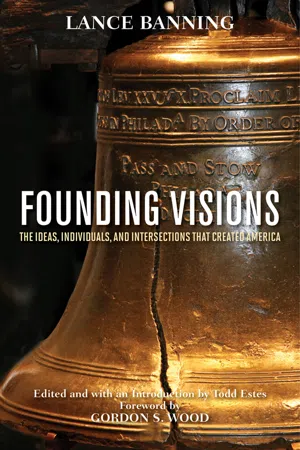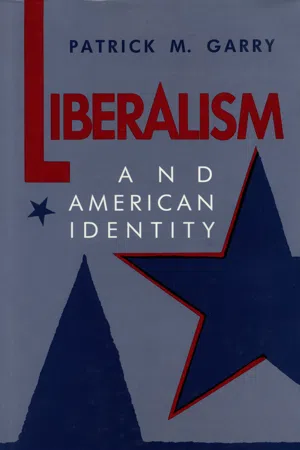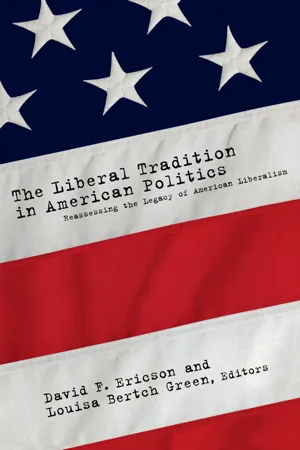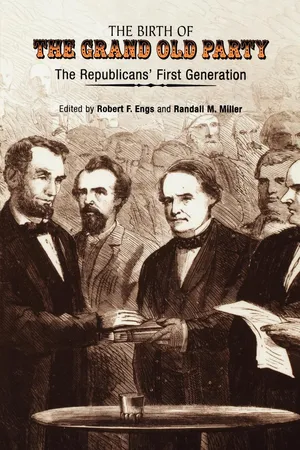History
Liberal Republicans
Liberal Republicans were a faction of the Republican Party in the United States during the late 19th century. They were characterized by their support for civil service reform, free trade, and a reduction in government spending. The movement lost momentum after the election of Rutherford B. Hayes in 1876.
Written by Perlego with AI-assistance
Related key terms
1 of 5
4 Key excerpts on "Liberal Republicans"
- eBook - ePub
Founding Visions
The Ideas, Individuals, and Intersections that Created America
- Lance Banning, Todd Estes(Authors)
- 2014(Publication Date)
- The University Press of Kentucky(Publisher)
34 This does not mean that the advent of a liberal perspective is without further value as an explanation of developments. It may mean, though, that we are well advised not to claim too much for its explanatory benefits. Like the concept of modernization, to which it seems to bear a resemblance, the rise of liberalism may explain too little if it is called upon to explain too much, too soon.In the end, I would suggest, it is no longer possible to accept any analysis of the first American party struggle that describes the Republicans and Federalists in terms of left versus right, liberal or progressive versus conservative or reactionary. If revisionary work has taught us anything, it has surely taught us that both parties were a bit of each. Prepared to understand the Jeffersonians as neither unambiguously left nor unequivocably right, I find instructive Appleby’s insistence that the desire to free the individual from formal restraints and to use the government to promote access to opportunity were major and essentially progressive elements of the Jeffersonian position, elements inadequately discussed in recent work. At the same time, I resist depiction of Jeffersonian Republicanism as a “flowering of liberal thought” or “a form of capitalism.” We cannot simply shut our eyes to the abundant evidence that the Republicans had many reservations about the eager, unrestrained pursuit of economic opportunity and even stronger reservations about the use of government to speed the processes of economic change. Republicans were conservative compared to their Hamiltonian opponents in several important respects. Appleby is right to stress that they conceived themselves as a progressive force, as the party seeking to defend and perfect a revolutionary new order. In America, however, this new order was commonly defined as one that had escaped or rejected major political, commercial, industrial, and financial changes that had overtaken contemporary England. These novelties the Jeffersonians were determined to resist.35 - eBook - ePub
- Patrick M. Garry(Author)
- 2011(Publication Date)
- The Kent State University Press(Publisher)
31Lincoln’s views and those of the Liberal Republicans foreshadowed the liberal ideas that gave birth to the New Deal. The Liberal Republicans broadly interpreted the “general welfare” clause of the Constitution in human welfare terms. The emancipation of slaves, the granting of free farmland to the landless, and the establishment of public education were all acts of a welfare state—a government directed to promote the “general welfare.” Lincoln’s view of the legitimate role of government, as FDR’s was to be, was “to do for a community of people whatever they need to have done, but cannot do at all, or cannot so well do for themselves, in their separate and individual capacities.” Adhering to this view, the Republican party for many years sponsored legislation to police big business, build state universities, conserve natural resources, and improve working conditions. Even later, during FDR’s administrations, Republican platforms increasingly recognized a governmental responsibility for the social welfare. The 1948 platform stated that the “tragic experience of Europe tells us that popular government disappears when it is ineffective and no longer can translate into action the aims and the aspirations of the people.”32 Forty years later, however, the Republican party, dominated by conservatives, repudiated this lesson from history.Woodrow Wilson—The Liberal as Defender of Individual Freedom and Opportunity in a World of Industrial Monopolies and International AutocracyAmerica changed greatly from the post–Civil War period to the beginning of the twentieth century. The U. S. economy had grown at an unprecedented rate. Millions of immigrants had come to America to work in the busy factories. And America had become a world leader in science and technology, and its colleges and universities offered promise of continued progress. - eBook - ePub
The Liberal Tradition in American Politics
Reassessing the Legacy of American Liberalism
- David F. Ericson, Louisa Bertch Green(Authors)
- 2013(Publication Date)
- Routledge(Publisher)
For the majority of these Republicans, phylogenetic liberalism represented a legitimate way of upholding the principles that their party had fought for during the Civil War, while finding common ground with moderate Southern Democrats willing to accept the basic principle of black citizenship (as long as it was placed firmly within the framework of white supremacy). The two groups could then enter into a productive alliance that would revive plantation agriculture and provide a healthy partner for Northern industry and investment. “I understand by the term ‘civil rights’ rights appertaining to the individual as a free, independent citizen; and what are they?” asked Senator Lyman Trumbull, a moderate Republican from Illinois. “The right to go and come; the right to enforce contracts; the right to convey his property; the right to buy property—these general rights that belong to mankind everywhere.” 41 Strongly adhered to by most moderate and conservative Republicans, such a relatively minimal understanding of the rights of citizenship was one with which even moderate Democrats could agree, particularly given the actual conditions in which, as discussed above, such rights were being formally implemented. To be sure, such rights, minimal as they were, did represent a tremendous legal advance over the conditions of slavery, when neither simple physical mobility, contractual choice, nor property holding existed in either promise or actuality. Consequently, as will be discussed below, many southern whites and conservative Democrats vehemently rejected them as illegitimate extensions of the rights of white men to an inferior race. Thus it is important to emphasize that phylogenetic liberalism was not, despite its explicit embrace of racial hierarchy, a reactionary doctrine for its time - eBook - ePub
The Birth of the Grand Old Party
The Republicans' First Generation
- Robert F. Engs, Randall M. Miller, Robert F. Engs, Randall M. Miller(Authors)
- 2011(Publication Date)
- University of Pennsylvania Press(Publisher)
Springfield Republican—held their own convention and nominated Horace Greeley for president. The dissidents called themselves Liberal Republicans. Initially, their alienation from the Grant administration had little to do with Reconstruction. The liberals, or self-styled “best men,” were alienated by the corruption that seemed pervasive in the Grant administration and by what they considered the degradation of a party increasingly under the control of local political machines and bosses. They were also alarmed by a rising tide of labor and farmer unrest in the North. These economically aggrieved groups called on the activist state spawned by the Civil War and Reconstruction to redress their own grievances. They sought to extend the Reconstruction principle of equality into economic relations within the North.Although hardly as sweeping as the destruction of slavery, the North experienced an economic revolution of its own in the Civil War era, as manufacturing output expanded rapidly and the railroad knitted the country into a single giant market. The rapid expansion of agriculture, mining, and railroad construction exemplified the shift from Lincoln's America—the world of the small farm and artisan workshop—into a mature industrial society. Increasingly, the Republican party was taking on a new identity, developing close relations with business corporations and, through railroad land grants and other largesse, seeking to promote economic development. It was this combination of machine politics, political corruption, and new demands on government that spurred Liberal Republicans to action. Many were former Radical Republicans, committed to the Reconstruction agenda of equal rights for all. But now that the legal framework of equality had been achieved, they insisted, the government should step back and let the economy develop according to its own internal laws.16Increasingly, the language in which the Liberals condemned northern politics echoed white complaints against the new governments in the South. The alleged corruption of carpetbaggers seemed to parallel the depredations of political bosses in the North. Black demands for land seemed analogous to northern labor's pressure for special favors. Complaints by the South's planters, merchants, and prewar politicians that the region's “natural leaders” had been excluded from power paralleled the reformers' sense that less than able men had pushed them to the side in the North. Violence and corruption in the South, reformers became convinced, arose from the fact that Reconstruction had not won the allegiance of “the part of the community that embodies the intelligence and the capital.”17
Index pages curate the most relevant extracts from our library of academic textbooks. They’ve been created using an in-house natural language model (NLM), each adding context and meaning to key research topics.



